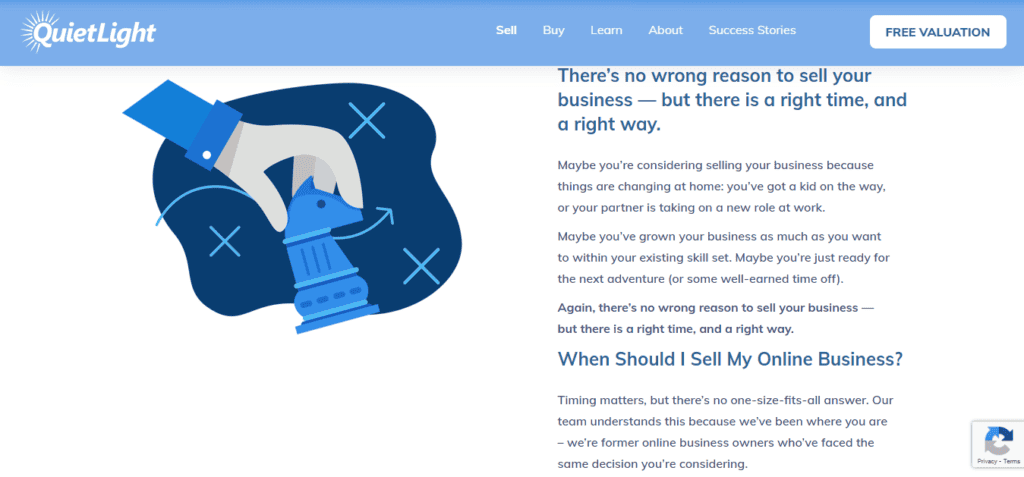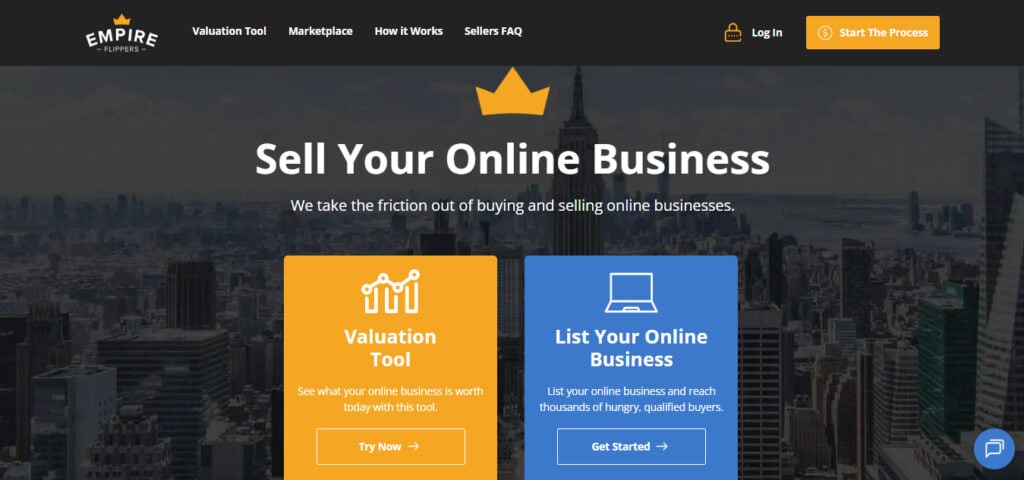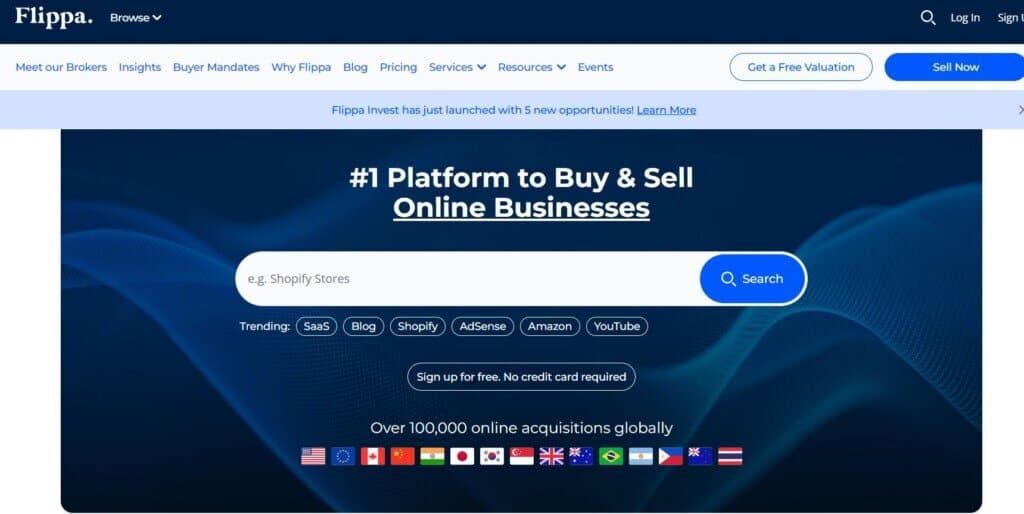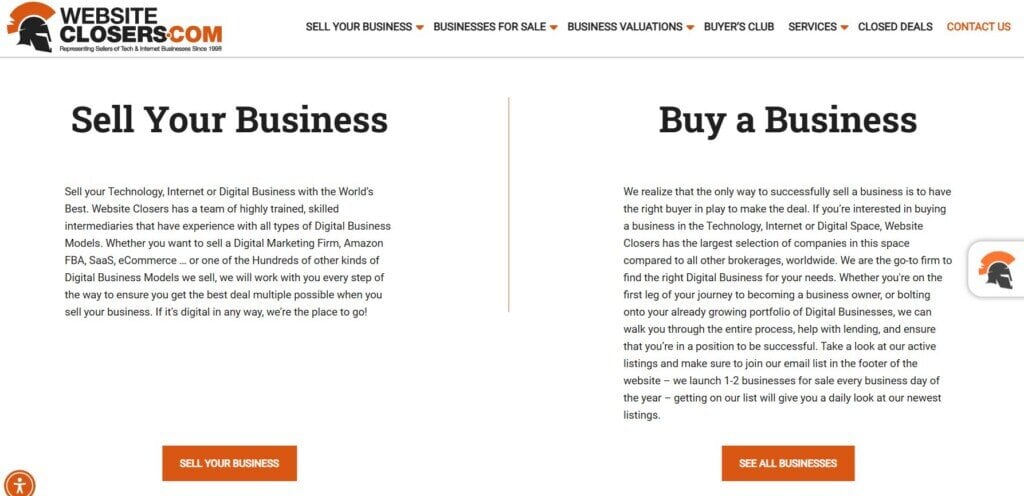Last Updated on October 6, 2025 by Ewen Finser
So, you’ve poured your blood, sweat, and tears into a Shopify store, generated a consistent revenue stream, and decided that the time has come to make an exit and sail off into the sunset. Great!
Well, maybe.
A lot of Shopify entrepreneurs underestimate the selling process. If you make the wrong deal, you could end up leaving a lot of money on the table.
Luckily, there are plenty of brokers and buy-and-sell platforms that can make life easier in this regard. However, choosing between them is a task all of its own.
In this article, I look at the biggest players in this space, and break down the advantages and drawbacks of each one.
Best Platforms to Sell Your Shopify Store
Quiet Light
Quiet Light is a full-service online business broker that has been around for nearly two decades. It specializes in mid-market deals in the six- and seven-figure valuation range, but also works on listings worth $10mn+.
To date, Quiet Light has facilitated over 750 business sales totaling more than $500 million in transaction value.

Pros
- Experienced, entrepreneur-led team: One of Quiet Light’s unique selling points is the fact it only hires experienced entrepreneurs as brokers. When you work with Quiet Light, you’ll get a dedicated agent who has either bought or sold an online business themselves. In my view, there’s no substitute for this type of real-world experience.
- Active buyer network: Although a hands-on brokerage like Quiet Light can’t offer the level of sheer exposure you’ll get with a public buy-and-sell platform like Flippa or Empire Flippers (more on these later), Quiet Light does have a large database of vetted buyers who are ready to invest. Brokers actively reach out to likely buyers and negotiate on your behalf.
- Seller-friendly commission: While I wouldn’t recommend focusing too much on price when it comes to brokers, business is business at the end of the day; you want the best deal you can get. Quiet Light’s commission tops out at 10% of sale price, and goes lower for deals worth more than $1 million. This is lower than most competitors in the space.
- High success rate and speed: The majority of Quiet Light listings sell within about 3 months. This isn’t as fast as some platforms, but for a broker that puts so much work into vetting buyers and finding the best possible deals, it’s impressive.
- Hands-on support: Quiet Light helps with valuations, prepping financials, buyer vetting, negotiations, escrow, and post-sale transition. If you’re determined to get as much as possible out of your sale, this level of service is a huge advantage. As you’ll see, not every platform offers so much help.
Cons
- Not ideal for very small stores: Quiet Light typically looks for businesses valued around $100k+. If your Shopify store is a side project making four-figure annual revenues, you’ll probably have to look elsewhere.
- Exclusive listing contract: When you commit to Quiet Light, you generally can’t simultaneously list your store elsewhere until your agreement with the company ends. This is common to all full-service brokerages, though, so it’s just something you’ll have to accept if this is the kind of service you want.
Empire Flippers
Empire Flippers is another heavyweight in the world of online business sales. Launched in 2011, it has grown into one of the largest curated marketplaces for buying and selling online businesses.
This curation comes in the form of a very careful vetting process for listings. So, you can’t just sign up and post your Shopify store overnight. Your business will need to meet certain criteria (for example, you’ll typically need to be making at least ~$2,000 monthly profit).
Once accepted, though, your listing goes in front of a huge audience: Empire Flippers reports having thousands of active buyers with over $10 billion in collective capital looking for deals.

Pros
- Huge marketplace exposure: Empire Flippers has one of the largest audiences of buyers actively looking for online businesses. As a seller with a qualified Shopify store, you tap into a network of thousands of investors, which means you’ll start finding potential buyers very quickly.
- Quality vetted listings: Although Empire Flippers doesn’t provide the same level of hands-on service as the likes of Quiet Light, it does take vetting and curation very seriously. Every listing goes through verification of its financials and traffic. While this results in more work for you at the listing stage, it contributes to a much greater level of buyer trust later on; the lack of this trust is a major issue with other large-scale buy-and-sell platforms.
- Full-service support: Empire Flippers will help you with valuation, the creation of your prospectus, negotiations, and escrow. It’s not as white-glove as Quiet Light, but it’s far more supportive than a platform like Flippa.
Cons
- “Race to the wire” system: Empire has a first-come-first-served system whereby the first buyer to pay the full asking price for a listing automatically gets to buy it. This, in my view, disadvantages a lot of sellers. Bidding wars are common on other platforms, and they can significantly increase the value of your sale. Unless you’re laser-focused on getting a deal done quickly (and, if you are, you shouldn’t be using Empire anyway, for reasons discussed below), I’d recommend looking elsewhere.
- High fees for smaller sales: This is the other big problem with Empire; it’s just too expensive for the level of service it offers. Commissions are 15% for sub-$700k deals, which is steep. While there is a sliding scale for larger listings, most Shopify entrepreneurs are still going to be paying over the odds with Empire Flippers.
- Not suited for <$100K businesses: Empire Flippers pretty much ignores very small listings. The ~$2k/month profit minimum means that most smaller Shopify stores won’t get a look in. Also, if your listing is worth less than $100k, the platform will class your account as “self-managed,” which means you won’t get a dedicated broker – you’ll basically need to answer all buyer questions by yourself.
- Listing process can be slow/involved: I mentioned Empire’s vetting process in the “Pros” column already, but it’s a double-edged sword. You’ll need to engage in a lot of back-and-forth before you’re listed, and the process can take weeks. If you’re eager to get a deal done quickly, this is the last thing you need.
Flippa
Flippa is basically the Wild West when it comes to buying and selling online businesses. You create your own listing and manage much of the process yourself; there’s generally very little in the way of oversight from the platform. This means you’ll encounter a lot more potential scams and unserious buyers than you will elsewhere.
Having been around since 2009, Flippa is one of the oldest platforms in this space. It started off primarily for buying/selling small content websites and domain names, but today it lists everything from starter Shopify stores to large seven-figure e-commerce businesses.

Pros
- Open to all business sizes: Flippa is great for smaller Shopify stores or new entrepreneurs. There’s no strict minimum in terms of revenue, profits, or deal size. This makes it a solid choice for businesses that aren’t big enough for the other platforms on this list.
- Massive buyer reach: Flippa has a huge audience. With millions of users and hundreds of thousands of buyers browsing, your listing can get a lot of exposure. This, in some cases, can lead to bidding wars that see sellers get three or four times their asking price. It also results in ultra-quick sales in a lot of cases; if you’re determined to get your sale over the line as quickly as possible, Flippa is definitely worth a look.
- User-friendly platform: The listing process is straightforward. Flippa’s interface guides you through the initial publication of your listing, and it has a simple dashboard and messaging system you can use to interact with potential buyers and manage offers.
- Affordable for large deals: Flippa’s commission maxes out at 10% for businesses worth less than $50,000, and goes as low as 3% for those worth $10mn or more. This is very competitive compared to full-service brokers.
- Additional services: While it’s a DIY platform, Flippa does offer optional paid services such as due diligence reports, buyer financing, and a concierge service for certain brokerage functions.
Cons
- You do the work: You get what you pay for. Flippa might be cheaper than standard brokers, but it’s also a lot more hands-on. You are responsible for creating an attractive listing, responding to inquiries, handling negotiations, and navigating escrow. There’s no broker to buffer or guide you. This is demanding and time-consuming, and also pretty technically difficult if you don’t have prior experience of selling a business.
- Tire-kickers and lowballers: Because anyone can contact you, you’re basically guaranteed to get unserious buyers in the mix. Expect questions from people who may never bid and offers that are far below your asking price.
- Potentially slower sales for larger businesses: While small Shopify sites tend to sell quickly on Flippa, it’s a different story for bigger businesses. Big-ticket buyers tend to prefer brokers or private networks.
- Fees and upsells can add up: While Flippa’s success fees are below the industry average, they also charge monthly listing fees and other add-ons. If you’re selling a small store, these can add up quickly.
- Less guidance on valuation: Flippa will not value your business for you; it’s up to you to name your price. Unless you have a lot of experience with valuation, this can be a minefield.
Website Closers
Website Closers is among the longest-standing brokerages in the business, having been around since 1998. It specializes in large online business sales, from Shopify stores and Amazon FBA brands to SaaS companies and tech firms.
Website Closers has facilitated over $2.2 billion in sales across nearly 2,500 business transactions. It also boasts an impressive close rate of 92%.

Pros
- Extensive experience: Website Closers is the longest-standing broker out of all those we’ve looked at here. This type of longevity comes with broad and deep experience, as well as an extensive contact list.
- Can handle very large sales: Website Closers is comfortable with eight-figure and even nine-figure transactions. If this is the ballpark you’re in, it might be a good idea for you to consider a broker (like Website Closers) that specializes in this area.
- High close rate: A 92% close rate speaks for itself. If you list with Website Closers, your sale is almost certain to get over the line eventually.
- Comprehensive services: Like other full-service brokers, Website Closers provides free valuations, prepares marketing materials, vets buyers, negotiates deals, and manages due diligence and escrow. Also, there will often be a full team working on deals, which means there will always be someone on hand to deal with issues as they arise.
Cons
- Opaque fee structure: Website Closers doesn’t publicly post its commission rates. This is a big red flag for me; it essentially means that the rate you pay will depend on your skill in negotiations. If this is something you’re comfortable with, it may not be a deal-breaker; however, if I was selling a Shopify store, I’d prefer to get commission information from my broker up front.
- Not very interested in smaller deals: While Website Closers officially handles deals of all sizes, it’s only reasonable to expect that a $200k listing will get less attention than an eight- or nine-figure sale. Unless your store is likely to sell for $5mn or more, I’d recommend looking elsewhere.
- Potentially slower sales process: Website Closers isn’t renowned for pushing quick sales; because its focus is on larger companies, it tends to take its time with deals in order to maximize value. Also, large deals naturally take longer (more due diligence, more negotiations). So, if you want a quick exit, Website Closers probably isn’t for you.
What’s the Verdict?
In my view, Quiet Light offers the best service for most Shopify sellers, especially those with six- and seven-figure businesses. The experience of the company’s brokers is unmatched in the market, and it also comes in at a reasonable price point compared to a lot of competitors. Alternatively, if yours is a smaller business and you want to get it sold quickly, Flippa is worth a look.

